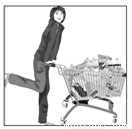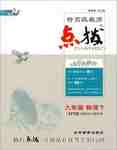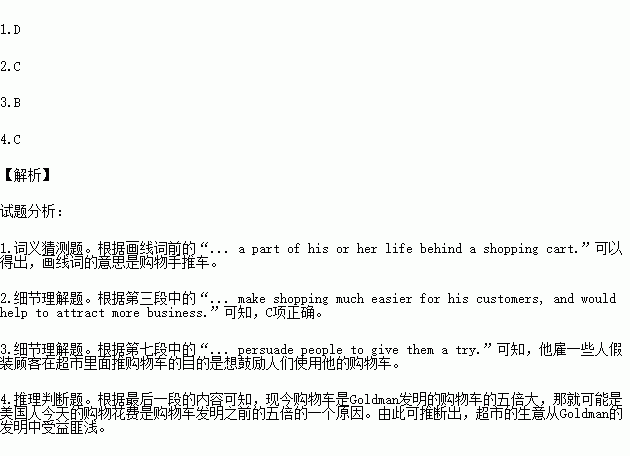题目内容
阅读理解。
Almost everybody in America will spend a part of his or her life behind a shopping cart. They will in a lifetime, push the chrome?plated_contraptions many miles. But few will know — or even think to ask — who it was that invented them.

Sylvan N. Goldman invented the shopping cart in 1937. At that time he was in the supermarket business. Every day he would see shoppers lugging groceries around in baskets they had to carry.
One day Goldman suddenly had the idea of putting baskets on wheels. The wheeled baskets would make shopping much easier for his customers, and would help to attract more business.
On June 4, 1937, Goldman's first carts were ready for use in his market. He was terribly excited on the morning of that day as customers began arriving. He couldn't wait to see them using his invention.
But Goldman was disappointed. Most shoppers gave the carts a long look, but hardly anybody would give them a try.
After a while, Goldman decided to ask customers why they weren't using his carts. “Don't you think this arm is strong enough to carry a shopping basket?” one shopper replied.
But Goldman wasn't beaten yet. He knew his carts would be a great success if only he could persuade people to give them a try. To this end, Goldman hired a group of people to push carts around his market and pretend they were shopping! Seeing this, the real customers gradually began copying the phony (假的) customers.
As Goldman had hoped, the carts were soon attracting larger and larger numbers of customers to his market. But not only did more people come — those who came bought more. With larger easier?to?handle baskets, customers unconsciously bought a greater number of items than before.
Today's shopping carts are five times larger than Goldman's original model. Perhaps that's one reason why Americans today spend more than five times as much money on food each year as they did before 1937 — the coming of the shopping cart.
1.What do the underlined words “chrome?plated contraptions” in the first paragraph refer to?
A.Baskets. B.Private cars.
C.Suitcases. D.Shopping carts.
2.What was the purpose of Goldman's invention?
A.It was to prove him to be a good inventor.
B.It was to reduce the burden of his employees' work.
C.It was to make shopping easier and attract more business.
D.It was to help the disabled make shopping easily in his market.
3.Goldman hired a group of people to push carts around his market in order to ________.
A.attract people to buy things in his market
B.encourage people to use his shopping carts
C.make his market different from the others
D.keep the groceries from being stolen
4.What can we infer from the last paragraph?
A.Goldman will become very famous because of his invention.
B.Goldman's invention will be regarded as the greatest one in the world.
C.Supermarket business has benefited a lot from Goldman's invention.
D.There will be nothing that can replace Goldman's invention.
 特高级教师点拨系列答案
特高级教师点拨系列答案
